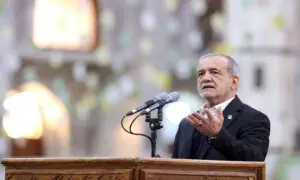Taj Mahal might be next after Indian begins survey of Gyanvapi mosque in Allahbad
3 min readLegal experts have feared that the high court’s decision in India has paved the way for Hindu claims on many other Muslim sites, Mathura Shahi Idgah Mosque, Qutb Minar, and Taj Mahal, BBC Urdu reported.
They raised the concerns after a decision of a district court in Banaras which upheld the scientific survey of the famous and historic Gyanvapi mosque. The mosque administration had challenged the Allahabad High Court decision.
But the court upheld the decision on Thursday and allowed the scientific survey of a mosque in view of the legal requirements.
The Archaeological Survey of India began started the scientific survey of the mosque in Uttar Pradesh under tight security on Friday. The mosque administration boycotted the survey when the designated people were present on the premises of the place of worship.
Statues of Shiv and Parvati, Varaha statue (Vishnu statue), bells, trident and many other things were found in the last survey of the mosque, according to Sohanlal Aria. He claimed that such pieces of evidence proved that it was a place of temple.
The BJP leaders have welcomed the decision and added that the truth has “come out now”.
“This is a good decision for Hindustanis. This is a thing which increases hope. It takes time but the truth comes out,” BJP lawmaker Pragya Singh Thakur said.
Court decision
A mosque in the Indian city of Allahabad is set to be investigated for allegedly being built on the site of a Hindu temple, India Today reported.
The Allahabad High Court rejected an appeal filed by the Gyanvapi mosque committee to stop an Archaeological survey on the site on Thursday.
The Archaeological Survey of India had already begun its work on July 24. However, the Muslim side took the matter to the Supreme Court which asked the High Court to decide it.
The survey can now be resumed as the appeal has been rejected.
The Gyanvapi mosque is built right next to the Kashi Vishwanath temple. Some historical sources claim it was built by Mughal Emperor Aurangzeb on the temple’s land.
The sources say that Maratha Queen Ahilyabai Holkar had the new temple built next to the mosque when she came to power in the 18th century.
The district court order that led to the survey by the ASI said that it had to conduct a ground penetrating radar survey below the ‘three domes of the building’ and then excavate if needed.
The main purpose of the investigation is to find if the mosque was constructed over a ‘pre-existing’ Hindu temple.
Although court cases over the matter have gone on for decades, the matter came to the spotlight again after five Hindu women asked for permission to pray at the mosques’ outer wall.
In 1992, Hindus destroyed the centuries-old Babri Mosque in Ayodhya after arguing that the important Hindu god Rama was born there.
The destruction led to nationwide clashes between Muslims and Hindus. At least 2,000 people were killed at the time. Today, a Hindu temple is being built on the site.
For the latest news, follow us on Twitter @Aaj_Urdu. We are also on Facebook, Instagram and YouTube.
























Comments are closed on this story.